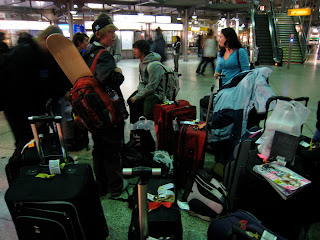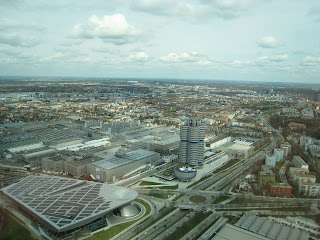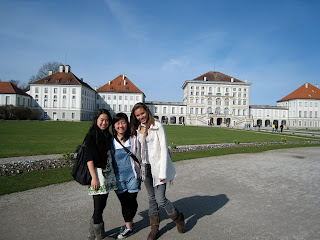Wednesday, April 14, 2010
Taylor S.'s research
Taylor S.'s journal entry
Kai's journal entry
Vergangenheitsbewältigung, a German term meaning “coming to terms with the past” is quite relevant for the citizens of modern day Germany. Since the terrible events of the Holocaust in the 1930s/1940s, Germans have had to cope with having one of history’s worst genocides take place (for the most part) in their home country. While no one in modern day Germany is to blame, naturally Germans must feel some sort of responsibility. Having Dachau, a Nazi killing camp in their country were [millions] of Jews were murdered, in their country cant be easy to live with. As far as Americans coming to terms with the past, the only things I can think of are either the Japanese internment during WW2 or the small scale massacre in the town of My Lai during the Vietnam War. Neither can even compare to the scale of the Holocaust, but both were violations of basic human rights. I believe that the term Vergangenheitsbewältigung is strictly a German problem. While there have been instances in American history that modern day Americans should come to terms with, no one does. The average American has no knowledge of the Vietnam War or of Japanese Internment, and it is because of this ignorance that there is nothing for them to come to terms with. Maybe it is because of the American lifestyle, or maybe it is because Americans have yet to do anything as appalling as the Holocaust. Lets hope that Americans never do anything that would require Vergangenheitsbewältigung.
Clarissa's journal entry
Zoë's journal entry
Alex's journal entry
Most of my stereotypes were wrong about both Germany and its citizens. One of my stereotypes had to do with relating the harshness of the German language to its people. I thought most Germans would be stern and rude because what they sound this way. There are definitely some people who are rude and mean, and their language only added to their demeanor. But most of the people I meet, like the waiters or the people working at shops, are very nice and welcoming. Most speak the harsh-sounding language with friendly smiles and appreciate our attempts at speaking their language with them.
My other preconception about Germany was that everything would be completely foreign and different from America. This is also quite untrue. Almost all the Germans we meet speak fluent English, making it easy for us to interact with them. The country itself is also not much different from the US, especially because there are McDonalds and Burger Kings around every corner. One main difference though is Germany’s history and the famous landmarks we have visited.
Sunday, April 11, 2010
Coming to Terms with the Past
Final Thoughts on Germany
Journal Entry
First Journal Entry
Longest German Word(s)
bauunterbeamtengesellschaft is the longest word in the German language at 79 letters,
My German Stereotypes
German Stereotypes
Diary Entry Two
2.I have noticed that the weather in Germany drastically changes depending on where you are. The first couple days i was wearing t shirts but now i am bundling up to face the snow!
German Stereotypes
Vergangenheitsbewältigung
Journal Entry: Dachau
Saturday, April 10, 2010
Journal Entry 4: What do German's have to come to terms with in history? What do Americans?
A Reflection on the Past
Prompt: Do you think there is any part of our history that modern Americans, as a people, have to come to terms with? Or do you think this is a strictly German problem?
Dealing with consequences of the past is a situation that all groups of people have to deal with as we all do things we are not exactly proud of. For example, while Germans have the heavy burden of dealing with the Holocaust, Americans must remember that the soil which they have built their wealth on was forcibly taken away from Native Americans who inhabited the land for many generations. It may be wrong to compare the Holocaust to Indian Removal in the United States, but both consist of unlawful removal of ethnic groups from their homes and many deaths during the process of removal.
I believe that both Germans and Americans have learned to come to terms with the past. Like I noted during the discussion following the visit to the Dachau Concentration Camp, Germans have allowed the camp to stay intact for public viewing. To me, that decision by itself is reason enough to believe that modern Germans have accepted history as they have nothing to hide. The acceptance of the American problem may not be as obvious, but continued efforts to provide Native Americans with rights and protection illustrates that Americans and their government recognize the problem made almost 200 years ago and are working to alleviate it.
These two incidences in history show that we should not dwell on the past, but rather remember the past as an indication that we have the power to make amends and move on.
On the Plane
While I sit here on the plane next to the oddly smelling man in 7B, I am trying to picture what Germany will be like. I think that the architecture will be similar to Italy, a mix of baroque and renaissance styles, but with modern influence. The inside of each building will be intricate in the small towns, but in the bigger cities, the western cultures’ influence will be more prominent. I imagine the people of Germany to be less friendly to Americans on the streets, because that is normally the case when you travel to a foreign country. In relation to the Holocaust, I believe that Germans have come to terms with their history and have moved on. If they wanted to completely forget and “cover it up” I think they would have just gotten rid of the concentration camps and memorials. Overall, I think traveling is about experiencing the country based on what you know, not what other people thought of. So when I travel, I always leave stereotypes behind when it comes to people so it doesn't alter my experience.
Monday, April 5, 2010
Sunday, April 4, 2010
More Munich
Friday, April 2, 2010
Photos from Day 3

Lots of time on the bus!

Snowball fight


Hiking to Neuschwanstein

Neuschwanstein castle in the snowstorm

Hohenschwangau Castle -- one of "Mad" King Ludwig's other castles, visible from Neuschwanstein

The insanely rococo Wieskirche

Oberammergau Spielhaus, home of the Passion Play that has taken place every 10 years since the 1600s

Wood carvings in Oberammergau

Lederhosen!
Explorica Tour Diary
Thursday, April 1, 2010
Day 3

It snowed all day today! For lunch we visited a typical German restaurant. As expected, after that 2 hour bus drive we were famished. It had a typical German menu consisting of sandwiches, spaghetti, hotdogs, and schnitzel. After a yummy meal, we had to hike thirty minutes while it was snowing to the Neuschwanstein Castle. The Neuschwanstein was the castle Walt Disney based both Disney Land and Disney World off of. Sadly, only one third of the rooms had been completed. However, we saw the king’s quarters and were in awe of the intricate detail in the wood. We were told that the entire room took a group of wood carvers 4 years to complete. To our amusement, it was our tour guides first English tour, and he misspoke many English words. After the tour, we took another hour bus ride to arrive in a town where we got an hour free time to explore the town. After another one hour bus ride, we finally got to the hotel! It is very comfortable and for dinner we had chicken and macaroni and cheese pasta. We all got to use showers that were actually functional, and a good time was had by all.
Wednesday, March 31, 2010
Fahren fahren fahren auf der Autobahn
 Freiburger Münster (cathedral)
Freiburger Münster (cathedral) Outside the cathedral
Outside the cathedral
 Inside the cathedral in Freiburg
Inside the cathedral in Freiburg Wurst (including donkey!) at the market in Freiburg
Wurst (including donkey!) at the market in Freiburg Cuckoo clock shop
Cuckoo clock shop Emily eating Black Forest Cake in the Black Forest for her birthday
Emily eating Black Forest Cake in the Black Forest for her birthday Small chapel near cuckoo clock shop
Small chapel near cuckoo clock shop
































